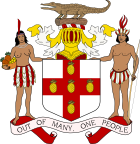
Eric Eustace Williams was a Trinidad and Tobago politician who is regarded by some as the "Father of the Nation", having led the then British Colony of Trinidad and Tobago to majority rule on 28 October 1956, to independence on 31 August 1962, and republic status on 1 August 1976, leading an unbroken string of general elections victories with his political party, the People's National Movement, until his death in 1981. He was the first Prime Minister of Trinidad and Tobago and also a noted Caribbean historian, especially for his book entitled Capitalism and Slavery.

The People's National Party (PNP) is a social-democratic political party in Jamaica, founded in 1938 by Norman Washington Manley who served as party president until his death in 1969. It holds 14 of the 63 seats in the House of Representatives, as 96 of the 227 local government divisions. The party is democratic socialist by constitution.

"Jamaica, Land We Love" is the national anthem of Jamaica, officially adopted in July 1962. It was chosen after a competition from September 1961 to 31 March 1962, in which the lyrics of the national anthem were selected by Jamaica's Houses of Parliament. When Jamaica was granted independence on 6 August 1962, "Jamaica, Land We Love" continued to be officially used as the national anthem.
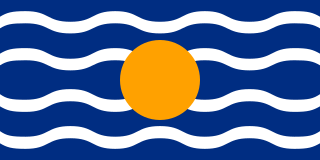
The West Indies Federation, also known as the West Indies, the Federation of the West Indies or the West Indian Federation, was a short-lived political union that existed from 3 January 1958 to 31 May 1962. Various islands in the Caribbean that were part of the British Empire, including Trinidad and Tobago, Barbados, Jamaica, and those on the Leeward and Windward Islands, came together to form the Federation, with its capital in Port of Spain, Trinidad and Tobago. The expressed intention of the Federation was to create a political unit that would become independent from Britain as a single state — possibly similar to Canada, the Federation of Australia, or the Federation of Rhodesia and Nyasaland. Before that could happen, the Federation collapsed due to internal political conflicts over how it would be governed or function viably. The formation of a West Indian Federation was encouraged by the United Kingdom, but also requested by West Indian nationalists.

The British West Indies (BWI) were colonised British territories in the West Indies: Anguilla, the Cayman Islands, Turks and Caicos Islands, Montserrat, the British Virgin Islands, Antigua and Barbuda, The Bahamas, Barbados, Dominica, Grenada, Jamaica, Saint Kitts and Nevis, Saint Lucia, Saint Vincent and the Grenadines, British Guiana and Trinidad and Tobago. Other territories included Bermuda, and the former British Honduras.

Sir William Alexander Clarke Bustamante was a Jamaican politician and labour leader, who, in 1962, became the first prime minister of Jamaica.
The Jamaica Labour Party is one of the two major political parties in Jamaica, the other being the People's National Party (PNP). While its name might suggest that it is a social democratic party, the JLP is actually a conservative party.
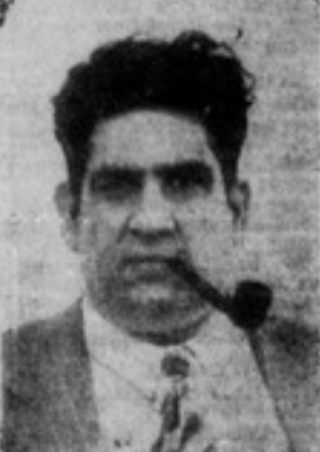
Albert Maria Gomes was a Trinidadian unionist, politician, and writer of Portuguese descent, was the first Chief Minister of Trinidad and Tobago. He was the founder of the Political Progress Groups and later led the Party of Political Progress Groups. He was active in the formation of the Democratic Labour Party (DLP) in Trinidad and Tobago and played a role in forcing Sir Alexander Bustamante out of the Federal Democratic Labour Party. Gomes briefly led DLP in 1963 when factions loyal to briefly ousted Rudranath Capildeo after Capildeo left Trinidad and Tobago to take up a position at the University of London. However, the rank and file of the party stood behind Capildeo, and Gomes left the party.

A referendum to approve the Évian Accords ending the Algerian War and granting self-determination to Algeria was held in France on 8 April 1962. It was approved by 90.8% of voters with a 75.3% turnout.
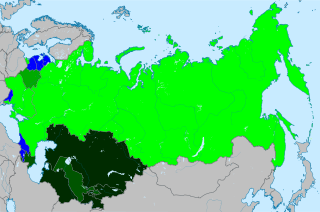
A referendum on the future of the Soviet Union was held on 17 March 1991 across the Soviet Union. It was the only national referendum in the history of the Soviet Union, although it was boycotted by authorities in six of the fifteen Soviet republics.
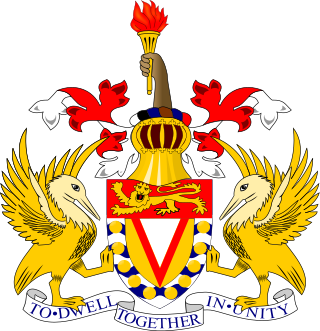
The prime minister of the West Indies Federation was the head of government of the short lived West Indies Federation, which consisted of ten provinces: Antigua, Barbados, Dominica, Grenada, Jamaica, Montserrat, St. Christopher-Nevis-Anguilla, St. Lucia, St. Vincent, and Trinidad and Tobago. The federation was formed on 3 January 1958, and was formally dissolved on 31 May 1962.

The flag of the West Indies Federation was used between 1958 and 1962. It bore four equally spaced narrow white stripes with a large orange-gold circle over the middle two lines in the center of the flag, undulating horizontally across a blue field representing the Caribbean Sea and the sun shining upon the waves. The flag was originally designed by Edna Manley. The flag is shown as 1:2; the upper two white stripes reflect the lower ones.

General elections were held in Antigua and Barbuda on 29 November 1960. They were won by the governing Antigua Labour Party (ALP), whose leader Vere Bird was re-elected as Chief Minister, a position he had held since 1 January 1960 when the position was created.

General elections were held for the Legislative Council in Nyasaland in August 1961. The result was a victory for the Malawi Congress Party, which won all 20 lower roll seats and two of the eight higher roll seats.

A referendum on financial issues was held in Puerto Rico on 10 December 1961. The referendum was approved by 82.8% of voters.
The Portuguese constitutional referendum was held on 19 March 1933. A draft of the Constitution had been published one year before and the public was invited to state any objections in the press. These tended to stay in the realm of generalities and only a handful of people, less than 6,000, voted against the new constitution. With its passage, women were allowed to vote for the first time in Portugal and given a voice in the National Assembly.
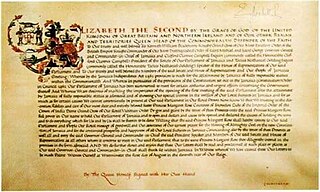
The Colony of Jamaica gained independence from the United Kingdom on 6 August 1962. In Jamaica, this date is celebrated as Independence Day, a national holiday.

A sovereignty referendum was held in the Ukrainian SSR on 17 March 1991 as part of a USSR-wide referendum. Voters were asked two questions on reforming the Soviet Union into a confederation of sovereign states. Most voters supported the proposal, although in the pro-independence oblasts of Ivano-Frankivsk, Lviv and Ternopil, voters opted for independence as part of an additional question.

Federal elections were held in the West Indies Federation for the first and only time on 25 March 1958. The result was a victory for the West Indies Federal Labour Party, which won 25 of the 45 seats in the House of Representatives.

Norman Washington Manley was a Jamaican statesman who served as the first and only Premier of Jamaica. A Rhodes Scholar, Manley became one of Jamaica's leading lawyers in the 1920s. Manley was an advocate of universal suffrage, which was granted by the British colonial government to the colony in 1944.
